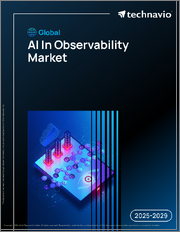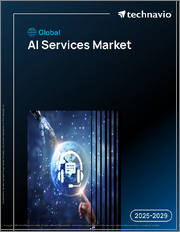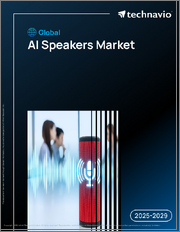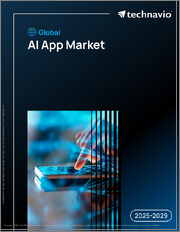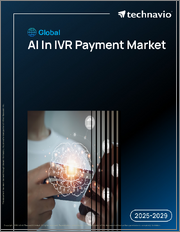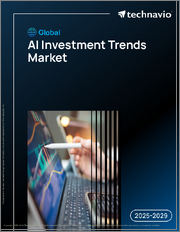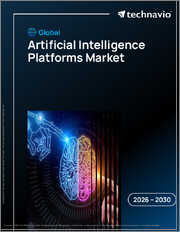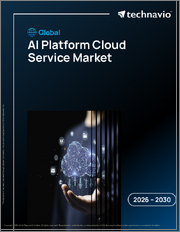
|
시장보고서
상품코드
1799103
인공지능(AI) 서버 시장Artificial Intelligence (AI) Servers |
||||||
세계의 인공지능(AI) 서버 시장은 2030년까지 846억 달러에 도달
2024년에 580억 달러로 추정되는 인공지능(AI) 서버 세계 시장은 2024-2030년간 CAGR 6.5%로 성장하여 2030년에는 846억 달러에 이를 것으로 예측됩니다. 본 보고서에서 분석한 부문 중 하나인 AI 트레이닝 서버는 CAGR 7.3%를 나타내고, 분석 기간 종료까지 613억 달러에 이를 것으로 예측됩니다. AI 추론 서버 부문의 성장률은 분석 기간중 CAGR 4.6%로 추정됩니다.
미국 시장은 약 153억 달러, 중국은 CAGR 6.2%로 성장 예측
미국의 인공지능(AI) 서버 시장은 2024년에 153억 달러로 추정됩니다. 세계 2위 경제대국인 중국은 2030년까지 135억 달러 규모에 이를 것으로 예측되며, 분석 기간인 2024-2030년 CAGR은 6.2%로 추정됩니다. 기타 주목해야 할 지역별 시장으로는 일본과 캐나다가 있으며, 분석 기간중 CAGR은 각각 5.9%와 5.5%를 보일 것으로 예측됩니다. 유럽에서는 독일이 CAGR 5.1%를 보일 전망입니다.
세계의 인공지능(AI) 서버 시장 - 주요 동향과 촉진요인 정리
AI 서버가 데이터 기반 세상에서 지능형 컴퓨팅의 근간이 되는 이유는 무엇일까?
인공지능 서버는 지능형 컴퓨팅 시대의 기반 인프라로 등장하여 급격한 데이터 증가와 AI 워크로드의 복잡성에 대응하기 위해 필요한 처리 능력을 구현하고 있습니다. 헬스케어, 금융, 제조, 자동차, 사이버 보안 등의 산업에서 AI 도입이 확대됨에 따라 딥러닝, 머신러닝, 신경망 트레이닝을 지원할 수 있는 고성능 서버의 필요성이 대두되고 있습니다. 기존 서버와 달리 AI 서버는 GPU, TPU, 고속 메모리, 병렬 처리 작업을 가속화하도록 설계된 상호 연결을 통합한 고급 아키텍처로 구축되어 있습니다. 이 서버는 대규모 언어 모델, 컴퓨터 비전 시스템, 예측 분석 엔진의 실시간 추론 및 고처리량 훈련을 용이하게 합니다. 부정행위 감지, 개인 맞춤형 의료, 음성 인식, 자율 시스템 등의 업무에 AI를 활용하는 기업들은 이러한 전용 서버의 방대한 컴퓨팅 성능에 의존하고 있습니다. 또한, 빅데이터와 엣지 AI 용도의 부상으로 중앙 집중식 데이터센터뿐만 아니라 엣지 위치에서도 데이터를 처리해야 하는 분산형 AI 인프라에 대한 수요가 증가하고 있습니다. AI 서버는 클라우드와 On-Premise 배포에서 핵심적인 역할을 하며, 기업이 워크로드를 안전하고 효율적으로 관리할 수 있는 유연성을 제공합니다. 또한, 방대한 컴퓨팅 리소스를 필요로 하는 TensorFlow, PyTorch, ONNX 등 최신 개발 프레임워크를 지원하는 데에도 매우 중요합니다. 기업들이 AI를 경쟁 우위로 인식하는 경향이 높아지면서 AI에 최적화된 서버에 대한 투자가 가속화되고 있습니다. 국가 디지털 혁신 전략, 스마트시티 개발, 자율 기술 생태계에서 AI의 통합이 진행되면서 AI가 세계 디지털 경제에 필수적인 요소로 자리 잡고 있다는 점에서 그 중요성이 더욱 부각되고 있습니다.
아키텍처 혁신과 구성 요소의 발전이 서버의 성능을 어떻게 견인하고 있는가?
AI 서버의 진화는 서버 아키텍처와 구성 요소 기술의 끊임없는 혁신을 통해 성능, 확장성, 에너지 효율을 크게 향상시키는 등 AI 서버의 진화를 주도하고 있습니다. 최신 AI 서버의 핵심은 고밀도 GPU 구성으로, 대부분 NVIDIA A100, H100, AMD Instinct 또는 수천 개의 코어를 제공하는 맞춤형 AI 가속기를 탑재하여 놀라운 속도로 병렬 연산을 실행할 수 있습니다. 이러한 구성 요소는 종종 멀티 소켓 CPU, 고대역폭 DDR5 및 HBM 메모리, 컴퓨트 유닛 간의 빠른 데이터 마이그레이션을 보장하는 PCIe Gen 5 인터페이스와 결합됩니다. NVLink, CXL 및 NVSwitch 기술은 서버 내 원활한 상호 연결을 촉진하고 지연 병목 현상을 제거하여 워크로드 처리량을 향상시키기 위해 통합되어 있습니다. AI 워크로드는 방대한 데이터 세트를 빠르게 처리하고 저장해야 하기 때문에 고속 NVMe SSD와 스토리지급 메모리가 서버 구성에 널리 채택되고 있습니다. 또한, 고밀도 컴퓨팅 환경에서 발생하는 고열을 관리하기 위해 수냉식 및 침수 기술 등의 냉각 기술도 도입되고 있습니다. 현재 많은 AI 서버는 모듈화를 염두에 두고 설계되어 기업은 전력 소비를 최적화하면서 컴퓨팅 요구에 따라 인프라를 확장할 수 있습니다. 또한, AI 서버의 설계는 대규모 자연어 처리 모델 학습을 위해 미세 조정된 모델, 추론 및 실시간 분석을 위한 모델 등 특정 워크로드에 맞게 최적화되고 있습니다. 벤더들은 AI 기반 원격 측정 및 관리 소프트웨어를 서버 생태계에 통합하여 실시간 모니터링, 예지보전, 성능 매개변수 자동 튜닝을 제공합니다. 이러한 하드웨어와 지능형 소프트웨어의 융합을 통해 AI 서버는 차세대 지능형 용도의 고유한 요구 사항을 충족시킬 수 있는 적응형 자기 최적화 플랫폼으로 변모하고 있습니다.
산업별 니즈, 클라우드 트렌드, 도입 모델은 시장 수요에 어떤 영향을 미칠까?
AI 서버에 대한 수요는 산업별 요구 사항, 클라우드 컴퓨팅의 급속한 확장, 배포 모델의 선호도 변화에 따라 크게 형성되고 있습니다. 헬스케어 등의 분야에서 AI 서버는 영상 진단 분석, 신약 개발, 환자 결과 예측 등 중요한 용도를 지원하고 있습니다. 금융 분야에서는 고빈도 거래, 사기 감지, 신용 평가가 강력한 백엔드 인프라를 통해 AI가 주도하는 신속한 의사결정에 의존하고 있습니다. 자동차 업계에서는 AI 서버를 활용하여 시뮬레이션 환경과 실제 주행 영상에서 얻은 방대한 데이터 세트를 활용하여 자율주행 알고리즘을 학습시키고 있습니다. 한편, 소매업과 이커머스에서는 고객 행동 분석과 추천 엔진이 AI에 최적화된 서버 인프라에 대한 의존도를 높이고 있습니다. 이러한 다양한 용도으로 인해 범용 서버 구성과 산업별 서버 구성에 대한 수요가 증가하고 있습니다. 클라우드 서비스 제공업체는 기업이 물리적 인프라를 소유하지 않고도 AI 서버를 이용할 수 있는 AI-as-a-Service를 제공함으로써 AI 기능에 대한 접근성을 확대하는 데 있어 매우 중요한 역할을 하고 있습니다. 이 모델은 퍼블릭, 프라이빗, 엣지 환경에 워크로드를 분산시키는 하이브리드 및 멀티 클라우드 전략의 등장으로 크게 성장했습니다. 따라서 AI 서버 벤더들은 클라우드 네이티브 및 컨테이너에 최적화된 하드웨어를 설계하고, Kubernetes 및 Docker와 같은 프레임워크를 지원하여 유연한 배포를 실현하고 있습니다. 엣지 컴퓨팅도 설계에 영향을 미치고 있으며, 원격지나 이동 가능한 장소에 배치할 수 있는 소형 AI 서버의 개발이 진행되고 있습니다. 이러한 엣지 서버는 데이터 소스 근처에서 실시간 의사결정을 가능하게 하고, 지연시간과 대역폭 비용을 절감합니다. AI가 더 많은 산업과 업무 환경에 침투함에 따라 AI 서버 시장은 클라우드 하이퍼스케일러, 엔터프라이즈 데이터센터, 산업용 엣지 용도에 이르기까지 다양한 솔루션이 제공되고 있습니다.
전 세계 AI 서버 시장의 성장 가속화 요인은?
AI 서버 시장의 성장은 인텔리전스 기반 운영, 자동화, 데이터 중심 혁신으로의 전환을 반영하는 몇 가지 시너지 효과에 의해 주도되고 있습니다. 비즈니스 운영, 공공 서비스, 과학 연구, 국방 분야에서 AI가 광범위하게 도입되면서 AI에 최적화된 서버만이 처리할 수 있는 컴퓨팅 성능에 대한 수요가 지속적으로 증가하고 있습니다. 가장 큰 원동력 중 하나는 디지털 기기, IoT 센서, 소셜 미디어 플랫폼, 기업 용도에 의해 생성되는 데이터의 급격한 증가입니다. AI 서버는 이 데이터를 실시간으로 처리하고 실행 가능한 인사이트를 도출하는 데 필요한 인프라를 제공합니다. 또한, 생성형 AI 및 대화 인터페이스에 사용되는 대규모 언어 모델 개발 및 도입이 급증하면서 수조 개의 파라미터를 처리할 수 있는 초고성능 트레이닝 서버에 대한 수요가 급증하고 있습니다. 세계 각국 정부는 과학, 의료, 보안 등 국가 역량을 강화하기 위해 AI 슈퍼컴퓨팅 인프라에 투자하고 있으며, 이는 시장 확대에 기여하고 있습니다. 칩, 메모리, 인터커넥트 기술 발전으로 컴퓨팅 유닛당 비용이 절감되어 중소기업도 AI 서버를 쉽게 이용할 수 있게 되었습니다. 또한, 스마트 제조, 인더스트리 4.0, 스마트 시티 인프라를 추진하는 이니셔티브를 통해 AI 서버가 물리적 환경에 통합되어 로봇 공학, 자동화, 예지보전 시스템의 동력이 되고 있습니다. 사이버 위협의 고도화도 한 요인으로 작용하고 있으며, AI 서버는 신속하고 적응적인 대응이 요구되는 위협 감지 알고리즘을 실행하는 데 사용되고 있습니다. 반도체 기업, 서버 제조업체, 클라우드 제공업체 간의 전략적 협업은 혁신과 시장 침투를 가속화하고 있습니다. AI가 세계 경제 전반의 전략적 우선순위가 됨에 따라 AI 서버 시장은 꾸준한 성장세를 이어가며 미래의 지능형 컴퓨팅 엔진으로 진화해 나갈 것으로 예측됩니다.
부문
유형(AI 트레이닝 서버, AI 추론 서버), 처리 유닛(GPU 기반 처리 유닛, 비GPU 기반 처리 유닛)
조사 대상 기업 예
- Alibaba Cloud
- Amazon Web Services(AWS)
- AMD
- Arm Holdings
- Baidu
- Cisco
- Cray(Hewlett Packard Enterprise)
- Dell Technologies
- Fujitsu
- Google Cloud
- Hewlett Packard Enterprise
- Huawei
- Inspur
- Intel
- IBM
- Lenovo
- Microsoft Azure
- NVIDIA
- Oracle
- Supermicro
AI 통합
우리는 검증된 전문가 컨텐츠와 AI툴에 의해서, 시장과 경쟁 정보를 변혁하고 있습니다.
Global Industry Analysts는 LLM나 업계 고유 SLM를 조회하는 일반적인 규범에 따르는 대신에, 비디오 기록, 블로그, 검색 엔진 조사, 방대한 양의 기업, 제품/서비스, 시장 데이터 등, 전 세계 전문가로부터 수집한 컨텐츠 리포지토리를 구축했습니다.
관세 영향 계수
Global Industry Analysts는 본사 소재지, 제조거점, 수출입(완제품 및 OEM)을 기준으로 기업의 경쟁력 변화를 예측했습니다. 이러한 복잡하고 다면적인 시장 역학은 수익원가(COGS) 증가, 수익성 하락, 공급망 재편 등 미시적, 거시적 시장 역학 중에서도 특히 경쟁사들에게 영향을 미칠 것으로 예측됩니다.
목차
제1장 조사 방법
제2장 주요 요약
- 시장 개요
- 주요 기업
- 시장 동향과 촉진요인
- 세계 시장 전망
제3장 시장 분석
- 미국
- 캐나다
- 일본
- 중국
- 유럽
- 프랑스
- 독일
- 이탈리아
- 영국
- 기타 유럽
- 아시아태평양
- 기타 지역
제4장 경쟁
LSH 25.09.03Global Artificial Intelligence (AI) Servers Market to Reach US$84.6 Billion by 2030
The global market for Artificial Intelligence (AI) Servers estimated at US$58.0 Billion in the year 2024, is expected to reach US$84.6 Billion by 2030, growing at a CAGR of 6.5% over the analysis period 2024-2030. AI Training Server, one of the segments analyzed in the report, is expected to record a 7.3% CAGR and reach US$61.3 Billion by the end of the analysis period. Growth in the AI Inference Server segment is estimated at 4.6% CAGR over the analysis period.
The U.S. Market is Estimated at US$15.3 Billion While China is Forecast to Grow at 6.2% CAGR
The Artificial Intelligence (AI) Servers market in the U.S. is estimated at US$15.3 Billion in the year 2024. China, the world's second largest economy, is forecast to reach a projected market size of US$13.5 Billion by the year 2030 trailing a CAGR of 6.2% over the analysis period 2024-2030. Among the other noteworthy geographic markets are Japan and Canada, each forecast to grow at a CAGR of 5.9% and 5.5% respectively over the analysis period. Within Europe, Germany is forecast to grow at approximately 5.1% CAGR.
Global Artificial Intelligence (AI) Servers Market - Key Trends & Drivers Summarized
Why Are AI Servers the Backbone of Intelligent Computing in a Data-Driven World?
Artificial Intelligence servers have emerged as foundational infrastructure in the era of intelligent computing, enabling the processing power required to handle the exponential growth in data and the increasing complexity of AI workloads. As AI adoption expands across industries such as healthcare, finance, manufacturing, automotive, and cybersecurity, the need for high-performance servers capable of supporting deep learning, machine learning, and neural network training has become critical. Unlike conventional servers, AI servers are built with advanced architectures that integrate GPUs, TPUs, high-speed memory, and interconnects designed to accelerate parallel processing tasks. These servers facilitate real-time inferencing and high-throughput training of large language models, computer vision systems, and predictive analytics engines. Organizations leveraging AI for tasks like fraud detection, personalized medicine, speech recognition, and autonomous systems rely on the massive computational capabilities of these specialized servers. Furthermore, the rise of big data and edge AI applications has intensified the demand for distributed AI infrastructure, where data needs to be processed not only in centralized data centers but also across edge locations. AI servers are central to both cloud and on-premise deployments, giving enterprises the flexibility to manage workloads securely and efficiently. They are also crucial in supporting modern development frameworks such as TensorFlow, PyTorch, and ONNX, which require extensive computational resources. As businesses increasingly view AI as a competitive advantage, investments in AI-optimized servers are accelerating. Their importance is further underscored by the rising integration of AI in national digital transformation strategies, smart city development, and autonomous technology ecosystems, making them indispensable to the global digital economy.
How Are Architectural Innovations and Component Advancements Driving Server Performance?
The evolution of AI servers is being propelled by continuous innovation in server architecture and component technologies, allowing for vastly improved performance, scalability, and energy efficiency. At the heart of modern AI servers are high-density GPU configurations, many featuring NVIDIA A100, H100, AMD Instinct, or custom AI accelerators that deliver thousands of cores capable of executing parallel computations at blistering speeds. These components are often paired with multi-socket CPUs, high-bandwidth DDR5 and HBM memory, and PCIe Gen 5 interfaces to ensure rapid data movement between compute units. NVLink, CXL, and NVSwitch technologies are being integrated to facilitate seamless interconnectivity within the server, eliminating latency bottlenecks and enhancing workload throughput. AI workloads require massive datasets to be processed and stored quickly, which is why high-speed NVMe SSDs and storage-class memory are being adopted widely in server configurations. Cooling innovations such as liquid cooling and immersion techniques are also being implemented to manage the intense heat generated by high-density computing environments. Many AI servers are now designed with modularity in mind, allowing enterprises to scale their infrastructure based on computational needs while optimizing power consumption. Furthermore, AI server designs are becoming increasingly optimized for specific workloads, with some models fine-tuned for training large-scale natural language processing models and others geared toward inferencing or real-time analytics. Vendors are embedding AI-driven telemetry and management software within server ecosystems to provide real-time monitoring, predictive maintenance, and automated tuning of performance parameters. This convergence of hardware and intelligent software is transforming AI servers into adaptive, self-optimizing platforms capable of meeting the unique demands of next-generation intelligent applications.
How Do Industry-Specific Needs, Cloud Trends, and Deployment Models Influence Market Demand?
The demand for AI servers is being heavily shaped by sector-specific requirements, the rapid expansion of cloud computing, and evolving preferences in deployment models. In sectors like healthcare, AI servers support critical applications such as diagnostic imaging analysis, drug discovery, and patient outcome prediction, all of which require high computational precision and data privacy. In the financial sector, high-frequency trading, fraud detection, and credit scoring rely on rapid AI-driven decision-making enabled by powerful backend infrastructure. The automotive industry is leveraging AI servers to train autonomous driving algorithms using massive datasets from simulation environments and real-world driving footage. Meanwhile, in retail and e-commerce, customer behavior analytics and recommendation engines are increasingly dependent on AI-optimized server infrastructure. These varying applications drive demand for both general-purpose and industry-specific server configurations. Cloud service providers are playing a pivotal role in expanding access to AI capabilities by offering AI-as-a-service, which allows organizations to utilize AI servers without owning physical infrastructure. This model has grown significantly with the advent of hybrid and multi-cloud strategies, where workloads are distributed across public, private, and edge environments. AI server vendors are therefore designing hardware that is cloud-native and container-optimized, supporting frameworks like Kubernetes and Docker for flexible deployment. Edge computing is also influencing design, prompting the development of compact AI servers that can be deployed in remote or mobile locations. These edge servers enable real-time decision-making close to data sources, reducing latency and bandwidth costs. As AI permeates more industries and operational environments, the market for AI servers is diversifying, with solutions tailored for cloud hyperscalers, enterprise data centers, and industrial edge applications alike.
What Is Fueling the Accelerated Growth of the AI Server Market Globally?
The growth in the AI server market is driven by several synergistic forces that reflect a global transition toward intelligence-led operations, automation, and data-centric innovation. The widespread adoption of AI in business operations, public services, scientific research, and defense is creating a relentless demand for computational power that only AI-optimized servers can meet. One of the most significant drivers is the exponential growth of data generated by digital devices, IoT sensors, social media platforms, and enterprise applications. AI servers provide the necessary infrastructure to process this data in real time and derive actionable insights. The surge in development and deployment of large language models, such as those used in generative AI and conversational interfaces, is also fueling demand for ultra-high-performance training servers that can handle trillions of parameters. Governments around the world are investing in AI supercomputing infrastructure to enhance national capabilities in science, healthcare, and security, contributing to market expansion. Technological advances in chips, memory, and interconnects are reducing the cost per compute unit, making AI servers more accessible to small and mid-sized businesses. Moreover, initiatives promoting smart manufacturing, Industry 4.0, and smart city infrastructure are embedding AI servers into physical environments where they power robotics, automation, and predictive maintenance systems. The growing sophistication of cyber threats is another factor, as AI servers are used to run threat detection algorithms that require rapid and adaptive responses. Strategic collaborations between semiconductor firms, server manufacturers, and cloud providers are accelerating innovation and market penetration. As AI becomes a strategic priority across the global economy, the AI server market is expected to continue expanding at a robust pace, evolving as the computational engine of the intelligent future.
SCOPE OF STUDY:
The report analyzes the Artificial Intelligence (AI) Servers market in terms of units by the following Segments, and Geographic Regions/Countries:
Segments:
Type (AI Training Server, AI Inference Server); Processing Unit (GPU-based Processing Unit, Non-GPU-based Processing Unit)
Geographic Regions/Countries:
World; United States; Canada; Japan; China; Europe (France; Germany; Italy; United Kingdom; and Rest of Europe); Asia-Pacific; Rest of World.
Select Competitors (Total 34 Featured) -
- Alibaba Cloud
- Amazon Web Services (AWS)
- AMD
- Arm Holdings
- Baidu
- Cisco
- Cray (Hewlett Packard Enterprise)
- Dell Technologies
- Fujitsu
- Google Cloud
- Hewlett Packard Enterprise
- Huawei
- Inspur
- Intel
- IBM
- Lenovo
- Microsoft Azure
- NVIDIA
- Oracle
- Supermicro
AI INTEGRATIONS
We're transforming market and competitive intelligence with validated expert content and AI tools.
Instead of following the general norm of querying LLMs and Industry-specific SLMs, we built repositories of content curated from domain experts worldwide including video transcripts, blogs, search engines research, and massive amounts of enterprise, product/service, and market data.
TARIFF IMPACT FACTOR
Our new release incorporates impact of tariffs on geographical markets as we predict a shift in competitiveness of companies based on HQ country, manufacturing base, exports and imports (finished goods and OEM). This intricate and multifaceted market reality will impact competitors by increasing the Cost of Goods Sold (COGS), reducing profitability, reconfiguring supply chains, amongst other micro and macro market dynamics.
TABLE OF CONTENTS
I. METHODOLOGY
II. EXECUTIVE SUMMARY
- 1. MARKET OVERVIEW
- Influencer Market Insights
- World Market Trajectories
- Tariff Impact on Global Supply Chain Patterns
- Artificial Intelligence (AI) Servers - Global Key Competitors Percentage Market Share in 2025 (E)
- Competitive Market Presence - Strong/Active/Niche/Trivial for Players Worldwide in 2025 (E)
- 2. FOCUS ON SELECT PLAYERS
- 3. MARKET TRENDS & DRIVERS
- Explosive Growth in AI Workloads and Model Complexity Spurs Demand for High-Performance AI Servers
- Here's How Generative AI and LLM Deployments Strengthen the Business Case for Purpose-Built AI Server Architectures
- Rising GPU and Accelerator Adoption Throws the Spotlight on Compute-Dense, Liquid-Cooled Server Infrastructure
- Data Center Modernization and Edge AI Expansion Expand the Addressable Market for Scalable AI Server Deployments
- Here's the Story: Hyperscale Cloud Providers Lead the Demand for Customizable, Multi-GPU AI Server Platforms
- Surging AI Adoption Across Healthcare, Finance, and Automotive Drives Sector-Specific AI Server Configurations
- Open Compute and Modular Server Designs Drive Flexibility and Speed in AI Hardware Procurement Cycles
- Here's How Integration of AI Servers with High-Speed Networking and Storage Infrastructure Optimizes End-to-End AI Pipelines
- AI-Powered Cybersecurity, Predictive Analytics, and Automation Use Cases Drive Enterprise AI Server Installations
- Growing Demand for On-Premise AI Compute in Regulated Industries Spurs Hybrid Cloud and Private AI Server Deployments
- Chip-Level Innovation by GPU, CPU, and AI ASIC Vendors Shapes Server Architecture Design and Competitive Differentiation
- Here's How AI Infrastructure-as-a-Service (AI-IaaS) and AI DevOps Trends Unlock Recurring Revenue Streams for Server Vendors
- 4. GLOBAL MARKET PERSPECTIVE
- TABLE 1: World Artificial Intelligence (AI) Servers Market Analysis of Annual Sales in US$ Million for Years 2014 through 2030
- TABLE 2: World Recent Past, Current & Future Analysis for Artificial Intelligence (AI) Servers by Geographic Region - USA, Canada, Japan, China, Europe, Asia-Pacific and Rest of World Markets - Independent Analysis of Annual Sales in US$ Million for Years 2024 through 2030 and % CAGR
- TABLE 3: World 6-Year Perspective for Artificial Intelligence (AI) Servers by Geographic Region - Percentage Breakdown of Value Sales for USA, Canada, Japan, China, Europe, Asia-Pacific and Rest of World Markets for Years 2025 & 2030
- TABLE 4: World Recent Past, Current & Future Analysis for AI Training Server by Geographic Region - USA, Canada, Japan, China, Europe, Asia-Pacific and Rest of World Markets - Independent Analysis of Annual Sales in US$ Million for Years 2024 through 2030 and % CAGR
- TABLE 5: World 6-Year Perspective for AI Training Server by Geographic Region - Percentage Breakdown of Value Sales for USA, Canada, Japan, China, Europe, Asia-Pacific and Rest of World for Years 2025 & 2030
- TABLE 6: World Recent Past, Current & Future Analysis for AI Inference Server by Geographic Region - USA, Canada, Japan, China, Europe, Asia-Pacific and Rest of World Markets - Independent Analysis of Annual Sales in US$ Million for Years 2024 through 2030 and % CAGR
- TABLE 7: World 6-Year Perspective for AI Inference Server by Geographic Region - Percentage Breakdown of Value Sales for USA, Canada, Japan, China, Europe, Asia-Pacific and Rest of World for Years 2025 & 2030
- TABLE 8: World Recent Past, Current & Future Analysis for GPU-based Processing Unit by Geographic Region - USA, Canada, Japan, China, Europe, Asia-Pacific and Rest of World Markets - Independent Analysis of Annual Sales in US$ Million for Years 2024 through 2030 and % CAGR
- TABLE 9: World 6-Year Perspective for GPU-based Processing Unit by Geographic Region - Percentage Breakdown of Value Sales for USA, Canada, Japan, China, Europe, Asia-Pacific and Rest of World for Years 2025 & 2030
- TABLE 10: World Recent Past, Current & Future Analysis for Non-GPU-based Processing Unit by Geographic Region - USA, Canada, Japan, China, Europe, Asia-Pacific and Rest of World Markets - Independent Analysis of Annual Sales in US$ Million for Years 2024 through 2030 and % CAGR
- TABLE 11: World 6-Year Perspective for Non-GPU-based Processing Unit by Geographic Region - Percentage Breakdown of Value Sales for USA, Canada, Japan, China, Europe, Asia-Pacific and Rest of World for Years 2025 & 2030
III. MARKET ANALYSIS
- UNITED STATES
- Artificial Intelligence (AI) Servers Market Presence - Strong/Active/Niche/Trivial - Key Competitors in the United States for 2025 (E)
- TABLE 12: USA Recent Past, Current & Future Analysis for Artificial Intelligence (AI) Servers by Type - AI Training Server and AI Inference Server - Independent Analysis of Annual Sales in US$ Million for the Years 2024 through 2030 and % CAGR
- TABLE 13: USA 6-Year Perspective for Artificial Intelligence (AI) Servers by Type - Percentage Breakdown of Value Sales for AI Training Server and AI Inference Server for the Years 2025 & 2030
- TABLE 14: USA Recent Past, Current & Future Analysis for Artificial Intelligence (AI) Servers by Processing Unit - GPU-based Processing Unit and Non-GPU-based Processing Unit - Independent Analysis of Annual Sales in US$ Million for the Years 2024 through 2030 and % CAGR
- TABLE 15: USA 6-Year Perspective for Artificial Intelligence (AI) Servers by Processing Unit - Percentage Breakdown of Value Sales for GPU-based Processing Unit and Non-GPU-based Processing Unit for the Years 2025 & 2030
- CANADA
- TABLE 16: Canada Recent Past, Current & Future Analysis for Artificial Intelligence (AI) Servers by Type - AI Training Server and AI Inference Server - Independent Analysis of Annual Sales in US$ Million for the Years 2024 through 2030 and % CAGR
- TABLE 17: Canada 6-Year Perspective for Artificial Intelligence (AI) Servers by Type - Percentage Breakdown of Value Sales for AI Training Server and AI Inference Server for the Years 2025 & 2030
- TABLE 18: Canada Recent Past, Current & Future Analysis for Artificial Intelligence (AI) Servers by Processing Unit - GPU-based Processing Unit and Non-GPU-based Processing Unit - Independent Analysis of Annual Sales in US$ Million for the Years 2024 through 2030 and % CAGR
- TABLE 19: Canada 6-Year Perspective for Artificial Intelligence (AI) Servers by Processing Unit - Percentage Breakdown of Value Sales for GPU-based Processing Unit and Non-GPU-based Processing Unit for the Years 2025 & 2030
- JAPAN
- Artificial Intelligence (AI) Servers Market Presence - Strong/Active/Niche/Trivial - Key Competitors in Japan for 2025 (E)
- TABLE 20: Japan Recent Past, Current & Future Analysis for Artificial Intelligence (AI) Servers by Type - AI Training Server and AI Inference Server - Independent Analysis of Annual Sales in US$ Million for the Years 2024 through 2030 and % CAGR
- TABLE 21: Japan 6-Year Perspective for Artificial Intelligence (AI) Servers by Type - Percentage Breakdown of Value Sales for AI Training Server and AI Inference Server for the Years 2025 & 2030
- TABLE 22: Japan Recent Past, Current & Future Analysis for Artificial Intelligence (AI) Servers by Processing Unit - GPU-based Processing Unit and Non-GPU-based Processing Unit - Independent Analysis of Annual Sales in US$ Million for the Years 2024 through 2030 and % CAGR
- TABLE 23: Japan 6-Year Perspective for Artificial Intelligence (AI) Servers by Processing Unit - Percentage Breakdown of Value Sales for GPU-based Processing Unit and Non-GPU-based Processing Unit for the Years 2025 & 2030
- CHINA
- Artificial Intelligence (AI) Servers Market Presence - Strong/Active/Niche/Trivial - Key Competitors in China for 2025 (E)
- TABLE 24: China Recent Past, Current & Future Analysis for Artificial Intelligence (AI) Servers by Type - AI Training Server and AI Inference Server - Independent Analysis of Annual Sales in US$ Million for the Years 2024 through 2030 and % CAGR
- TABLE 25: China 6-Year Perspective for Artificial Intelligence (AI) Servers by Type - Percentage Breakdown of Value Sales for AI Training Server and AI Inference Server for the Years 2025 & 2030
- TABLE 26: China Recent Past, Current & Future Analysis for Artificial Intelligence (AI) Servers by Processing Unit - GPU-based Processing Unit and Non-GPU-based Processing Unit - Independent Analysis of Annual Sales in US$ Million for the Years 2024 through 2030 and % CAGR
- TABLE 27: China 6-Year Perspective for Artificial Intelligence (AI) Servers by Processing Unit - Percentage Breakdown of Value Sales for GPU-based Processing Unit and Non-GPU-based Processing Unit for the Years 2025 & 2030
- EUROPE
- Artificial Intelligence (AI) Servers Market Presence - Strong/Active/Niche/Trivial - Key Competitors in Europe for 2025 (E)
- TABLE 28: Europe Recent Past, Current & Future Analysis for Artificial Intelligence (AI) Servers by Geographic Region - France, Germany, Italy, UK and Rest of Europe Markets - Independent Analysis of Annual Sales in US$ Million for Years 2024 through 2030 and % CAGR
- TABLE 29: Europe 6-Year Perspective for Artificial Intelligence (AI) Servers by Geographic Region - Percentage Breakdown of Value Sales for France, Germany, Italy, UK and Rest of Europe Markets for Years 2025 & 2030
- TABLE 30: Europe Recent Past, Current & Future Analysis for Artificial Intelligence (AI) Servers by Type - AI Training Server and AI Inference Server - Independent Analysis of Annual Sales in US$ Million for the Years 2024 through 2030 and % CAGR
- TABLE 31: Europe 6-Year Perspective for Artificial Intelligence (AI) Servers by Type - Percentage Breakdown of Value Sales for AI Training Server and AI Inference Server for the Years 2025 & 2030
- TABLE 32: Europe Recent Past, Current & Future Analysis for Artificial Intelligence (AI) Servers by Processing Unit - GPU-based Processing Unit and Non-GPU-based Processing Unit - Independent Analysis of Annual Sales in US$ Million for the Years 2024 through 2030 and % CAGR
- TABLE 33: Europe 6-Year Perspective for Artificial Intelligence (AI) Servers by Processing Unit - Percentage Breakdown of Value Sales for GPU-based Processing Unit and Non-GPU-based Processing Unit for the Years 2025 & 2030
- FRANCE
- Artificial Intelligence (AI) Servers Market Presence - Strong/Active/Niche/Trivial - Key Competitors in France for 2025 (E)
- TABLE 34: France Recent Past, Current & Future Analysis for Artificial Intelligence (AI) Servers by Type - AI Training Server and AI Inference Server - Independent Analysis of Annual Sales in US$ Million for the Years 2024 through 2030 and % CAGR
- TABLE 35: France 6-Year Perspective for Artificial Intelligence (AI) Servers by Type - Percentage Breakdown of Value Sales for AI Training Server and AI Inference Server for the Years 2025 & 2030
- TABLE 36: France Recent Past, Current & Future Analysis for Artificial Intelligence (AI) Servers by Processing Unit - GPU-based Processing Unit and Non-GPU-based Processing Unit - Independent Analysis of Annual Sales in US$ Million for the Years 2024 through 2030 and % CAGR
- TABLE 37: France 6-Year Perspective for Artificial Intelligence (AI) Servers by Processing Unit - Percentage Breakdown of Value Sales for GPU-based Processing Unit and Non-GPU-based Processing Unit for the Years 2025 & 2030
- GERMANY
- Artificial Intelligence (AI) Servers Market Presence - Strong/Active/Niche/Trivial - Key Competitors in Germany for 2025 (E)
- TABLE 38: Germany Recent Past, Current & Future Analysis for Artificial Intelligence (AI) Servers by Type - AI Training Server and AI Inference Server - Independent Analysis of Annual Sales in US$ Million for the Years 2024 through 2030 and % CAGR
- TABLE 39: Germany 6-Year Perspective for Artificial Intelligence (AI) Servers by Type - Percentage Breakdown of Value Sales for AI Training Server and AI Inference Server for the Years 2025 & 2030
- TABLE 40: Germany Recent Past, Current & Future Analysis for Artificial Intelligence (AI) Servers by Processing Unit - GPU-based Processing Unit and Non-GPU-based Processing Unit - Independent Analysis of Annual Sales in US$ Million for the Years 2024 through 2030 and % CAGR
- TABLE 41: Germany 6-Year Perspective for Artificial Intelligence (AI) Servers by Processing Unit - Percentage Breakdown of Value Sales for GPU-based Processing Unit and Non-GPU-based Processing Unit for the Years 2025 & 2030
- ITALY
- TABLE 42: Italy Recent Past, Current & Future Analysis for Artificial Intelligence (AI) Servers by Type - AI Training Server and AI Inference Server - Independent Analysis of Annual Sales in US$ Million for the Years 2024 through 2030 and % CAGR
- TABLE 43: Italy 6-Year Perspective for Artificial Intelligence (AI) Servers by Type - Percentage Breakdown of Value Sales for AI Training Server and AI Inference Server for the Years 2025 & 2030
- TABLE 44: Italy Recent Past, Current & Future Analysis for Artificial Intelligence (AI) Servers by Processing Unit - GPU-based Processing Unit and Non-GPU-based Processing Unit - Independent Analysis of Annual Sales in US$ Million for the Years 2024 through 2030 and % CAGR
- TABLE 45: Italy 6-Year Perspective for Artificial Intelligence (AI) Servers by Processing Unit - Percentage Breakdown of Value Sales for GPU-based Processing Unit and Non-GPU-based Processing Unit for the Years 2025 & 2030
- UNITED KINGDOM
- Artificial Intelligence (AI) Servers Market Presence - Strong/Active/Niche/Trivial - Key Competitors in the United Kingdom for 2025 (E)
- TABLE 46: UK Recent Past, Current & Future Analysis for Artificial Intelligence (AI) Servers by Type - AI Training Server and AI Inference Server - Independent Analysis of Annual Sales in US$ Million for the Years 2024 through 2030 and % CAGR
- TABLE 47: UK 6-Year Perspective for Artificial Intelligence (AI) Servers by Type - Percentage Breakdown of Value Sales for AI Training Server and AI Inference Server for the Years 2025 & 2030
- TABLE 48: UK Recent Past, Current & Future Analysis for Artificial Intelligence (AI) Servers by Processing Unit - GPU-based Processing Unit and Non-GPU-based Processing Unit - Independent Analysis of Annual Sales in US$ Million for the Years 2024 through 2030 and % CAGR
- TABLE 49: UK 6-Year Perspective for Artificial Intelligence (AI) Servers by Processing Unit - Percentage Breakdown of Value Sales for GPU-based Processing Unit and Non-GPU-based Processing Unit for the Years 2025 & 2030
- REST OF EUROPE
- TABLE 50: Rest of Europe Recent Past, Current & Future Analysis for Artificial Intelligence (AI) Servers by Type - AI Training Server and AI Inference Server - Independent Analysis of Annual Sales in US$ Million for the Years 2024 through 2030 and % CAGR
- TABLE 51: Rest of Europe 6-Year Perspective for Artificial Intelligence (AI) Servers by Type - Percentage Breakdown of Value Sales for AI Training Server and AI Inference Server for the Years 2025 & 2030
- TABLE 52: Rest of Europe Recent Past, Current & Future Analysis for Artificial Intelligence (AI) Servers by Processing Unit - GPU-based Processing Unit and Non-GPU-based Processing Unit - Independent Analysis of Annual Sales in US$ Million for the Years 2024 through 2030 and % CAGR
- TABLE 53: Rest of Europe 6-Year Perspective for Artificial Intelligence (AI) Servers by Processing Unit - Percentage Breakdown of Value Sales for GPU-based Processing Unit and Non-GPU-based Processing Unit for the Years 2025 & 2030
- ASIA-PACIFIC
- Artificial Intelligence (AI) Servers Market Presence - Strong/Active/Niche/Trivial - Key Competitors in Asia-Pacific for 2025 (E)
- TABLE 54: Asia-Pacific Recent Past, Current & Future Analysis for Artificial Intelligence (AI) Servers by Type - AI Training Server and AI Inference Server - Independent Analysis of Annual Sales in US$ Million for the Years 2024 through 2030 and % CAGR
- TABLE 55: Asia-Pacific 6-Year Perspective for Artificial Intelligence (AI) Servers by Type - Percentage Breakdown of Value Sales for AI Training Server and AI Inference Server for the Years 2025 & 2030
- TABLE 56: Asia-Pacific Recent Past, Current & Future Analysis for Artificial Intelligence (AI) Servers by Processing Unit - GPU-based Processing Unit and Non-GPU-based Processing Unit - Independent Analysis of Annual Sales in US$ Million for the Years 2024 through 2030 and % CAGR
- TABLE 57: Asia-Pacific 6-Year Perspective for Artificial Intelligence (AI) Servers by Processing Unit - Percentage Breakdown of Value Sales for GPU-based Processing Unit and Non-GPU-based Processing Unit for the Years 2025 & 2030
- REST OF WORLD
- TABLE 58: Rest of World Recent Past, Current & Future Analysis for Artificial Intelligence (AI) Servers by Type - AI Training Server and AI Inference Server - Independent Analysis of Annual Sales in US$ Million for the Years 2024 through 2030 and % CAGR
- TABLE 59: Rest of World 6-Year Perspective for Artificial Intelligence (AI) Servers by Type - Percentage Breakdown of Value Sales for AI Training Server and AI Inference Server for the Years 2025 & 2030
- TABLE 60: Rest of World Recent Past, Current & Future Analysis for Artificial Intelligence (AI) Servers by Processing Unit - GPU-based Processing Unit and Non-GPU-based Processing Unit - Independent Analysis of Annual Sales in US$ Million for the Years 2024 through 2030 and % CAGR
- TABLE 61: Rest of World 6-Year Perspective for Artificial Intelligence (AI) Servers by Processing Unit - Percentage Breakdown of Value Sales for GPU-based Processing Unit and Non-GPU-based Processing Unit for the Years 2025 & 2030






